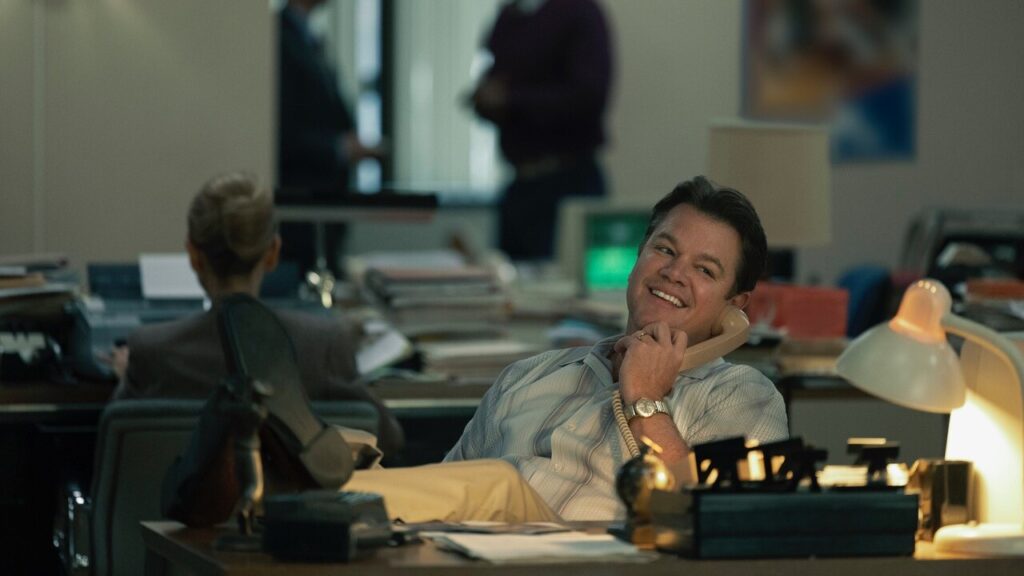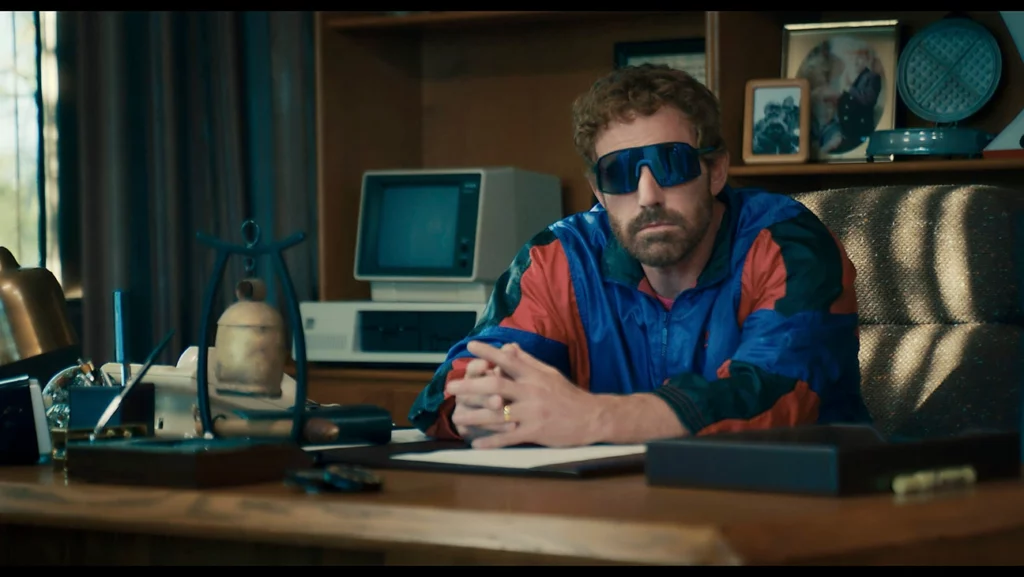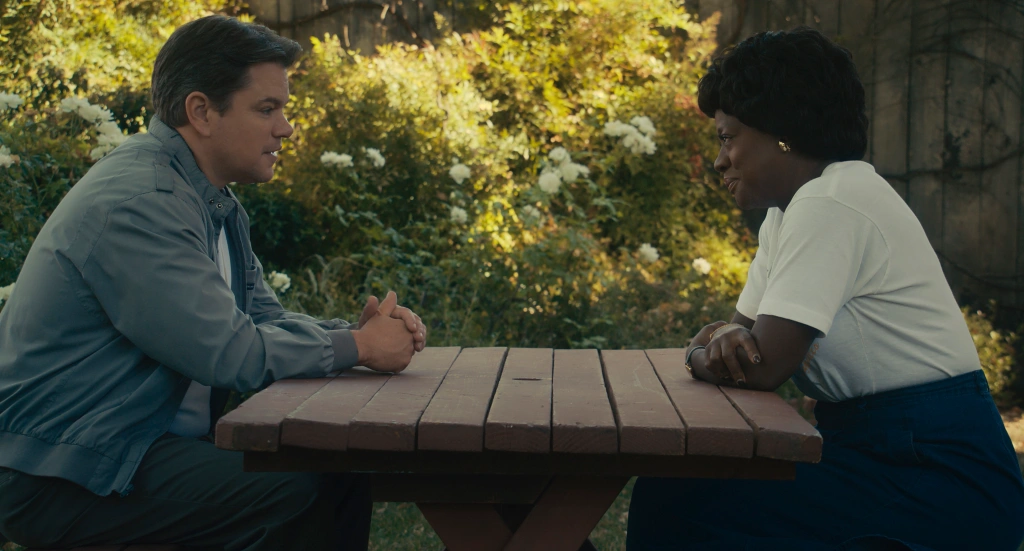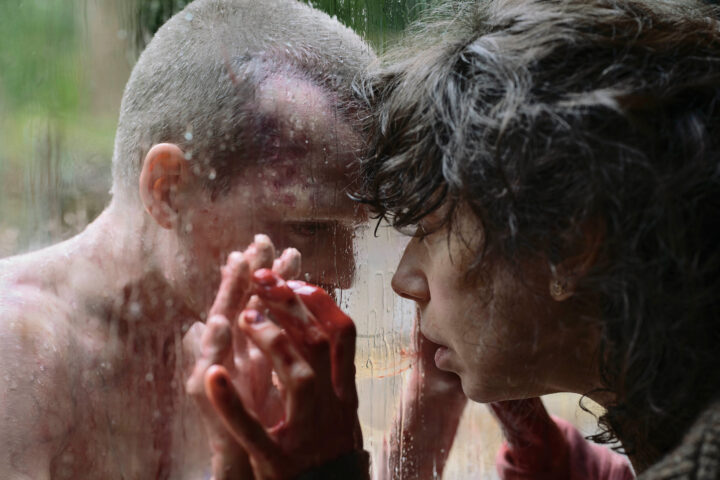As a commercial entertainment, Ben Affleck’s Air, charting Nike’s quest to sign rookie-on-the-rise Michael Jordan as its brand ambassador, is polished, serviceably entertaining and, on occasion, better. Whether its story, about how the former market laggard created the axis-shifting Air Jordan, is as substantial as the filmmakers think it is may be another matter.
Picture opens in 1984, the Oregon-headquartered athletic giant then significantly trailing competitors Adidas and Converse, its sales on the skids and with little youth market cache. In the company’s corporate office we meet beleaguered marketing exec Sonny Vaccaro, beautifully played by Matt Damon, who knows Nike needs a commercial reversal but is hamstrung without budget or support from CEO Phil Knight (an ornery, pontificating, barefoot Affleck). Vaccaro’s closest colleague and confidant is marketing VP Rob Strasser (Jason Bateman), a player expert who shares his marketing buddy’s pain, and the company’s NBA connection is fast-talking Howard White (Chris Tucker). Peter Moore (Matthew Maher), Nike’s lead shoe designer, will be the driving force behind what will eventually become a commercial landmark.
On the periphery of the ensemble is Michael Jordan’s unctuous agent David Falk (Chris Messina) and college basketball coach and Jordan mentor George Raveling (Marlon Wayans), instrumental in sparking The Big Idea that will become Vaccaro’s dogged quest to sign the future legend to Nike. This hero’s journey of sorts will transform the company, revolutionize player-company compensation models and ultimately create a seismic shift in American culture (or so the movie tells us, though that score is perhaps more subjective).
Vaccaro’s lofty hoop dream is at once and seemingly forever out of reach, cash-strapped Nike unable to compete with Adidas (Michael’s favorite) and Converse, both also hot on the athlete’s trail. Honcho Knight is against the idea of a single player representing the brand, and even more against another potential failure for middling Vaccaro, already on the ropes with the board and now demanding budget and cash outlays the company simply cannot cover.

Enter the Jordans, led by matriarch and principal negotiator Deloris (a focused, appealing Viola Davis), who receives an unorthodox, at-home visit from the overzealous Vaccaro, attempting to curry favor and leading to a broadly comic confrontation where Messina, a terrific actor, goes too large; such grandstanding gets laughs but feels outsized here in its “show me the money” maximalism. Also in view are recessive James Jordan (Julius Tennon), who lets wife Deloris do the talking, and young Michael (Damian Delano Young), face obscured by coy directorial peek-a-boo.
Despite being cash strapped and outmatched by more popular competitors, Vaccaro is undeterred, staking the company and its employees’ livelihoods on the line, including that of single father Strasser, who explains the risk in a brief, potent exchange. These efforts lead to two indelible scenes that all but deliver the film.
In the first, Damon sensationally delivers a heartfelt, improvisational sales-pitch to the Jordans (“It’s just a shoe until someone steps into it”), contextualizing the impending cultural impact of a Jordan-Nike collaboration while at the same time offering a finely observed rumination on the merciless consequences of celebrity. As written by screenwriter Alex Convery and spoken by Damon with immense conviction, it is a perfect marriage of actor and material; Damon sells the hell out of it.
The second scene comes late in the film as a shrewd Deloris negotiates the best deal for her son’s future, laying out a list of requirements should Michael sign with Nike. The beauty of this phone call, so well acted between Davis and Damon, isn’t just in Deloris’ expert power of persuasion, which shifts the balance of bargaining power from upper-hand, hardline corporate policy to savvy, maternal common sense. The equal impact is the change we witness in Vaccaro as the call shifts his allegiance from company man to fair-is-fair players’ advocate. Damon brilliantly conveys this paradigm shift, one which in future years would forever change player leverage in sports marketing. Such exchanges are so terrifically rendered it makes one wish that Air, amiable and pleasant as it is, had more such substantively dramatic moments.

Affleck (whose best-directed film is still 2007’s blistering Gone Baby Gone) keeps the entertaining film moving at a clip. Yet at the basic narrative level, is Nike signing Michael Jordan to a contract (one that still makes him $400 million a year in passive income) and creating legendary tennis shoes the stuff of great drama, especially when the triumph as depicted here is perhaps one of corporate turnaround?
Certainly Vaccaro’s vision and vindication are admirable and to some extent satisfying, but the film’s finale seems perhaps less consequential than the best sports films, where victory is hard won on the court or field. In Air, a game-changing corporate deal is built and a case is stated for how American culture will embrace what became the most successful athletic shoe in history. But is that dramatically substantive enough onscreen? Not all of the time.
Perhaps some of this comes down to Damon’s Vaccaro, about whom we learn little outside of the picture’s central pursuit. Who is he? What does he stand for? What is his life outside of work? We simply are not afforded these details. Such narrow focus is indicative of Air’s streamlined plot, giving its characters little dimensional texture beyond their roles in the question of will he or won’t he sign?
Technical credits are largely perfunctory despite one of the world’s great cinematographers, Ralph Richardson, lensing the film. Worth mentioning is the music, Affleck cramming the film with wall-to-wall 80s Top 40—deploying dozens of songs in what amounts to a distractingly overplayed nostalgic hand pushing our buttons, given that each song is used for about a mere 15 seconds as scene transition or to underscore the action onscreen (for example, All I Need is a Miracle figures prominently when it look as if Michael won’t sign). The director also, oddly, borrows obscure 1980s film instrumentals, directly lifting Pino Donaggio’s sensuous Body Double score (memorably used in that film to underline a provocative striptease motif but here randomly inserted), a few seconds of Thomas Newman’s Real Genius orchestration and essaying something nearly identical to Tangerine Dream’s classic Risky Business composition.
In some corners Air has been instantly hailed as a great sports drama. But in truth, it is a diverting and enjoyable story of redemption for a flailing corporation. That Damon, who is so good here, is able to nearly convince us the film is instead about the redemption of an underdog who finally has his day—one with the chutzpah to achieve the grandest, most unlikely outcome—may be the film’s real achievement.
Air is worth seeing for Damon and Davis, giving it their all. It is the definition of a feel-good crowd pleaser that will undoubtedly sell as many units of its famed flagship product as it does movie tickets. Why not?
3 stars



